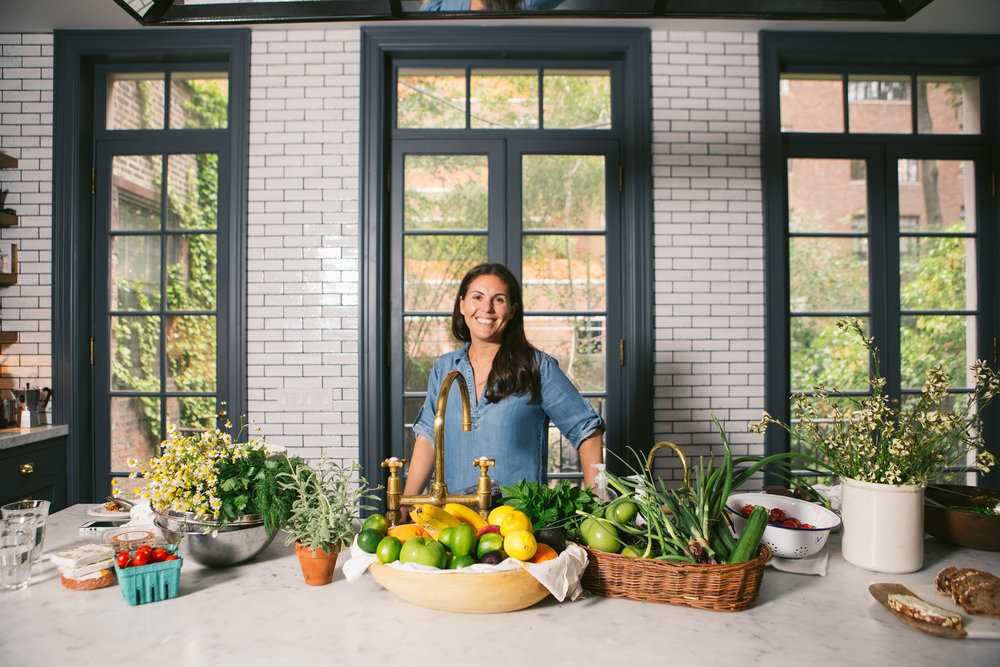
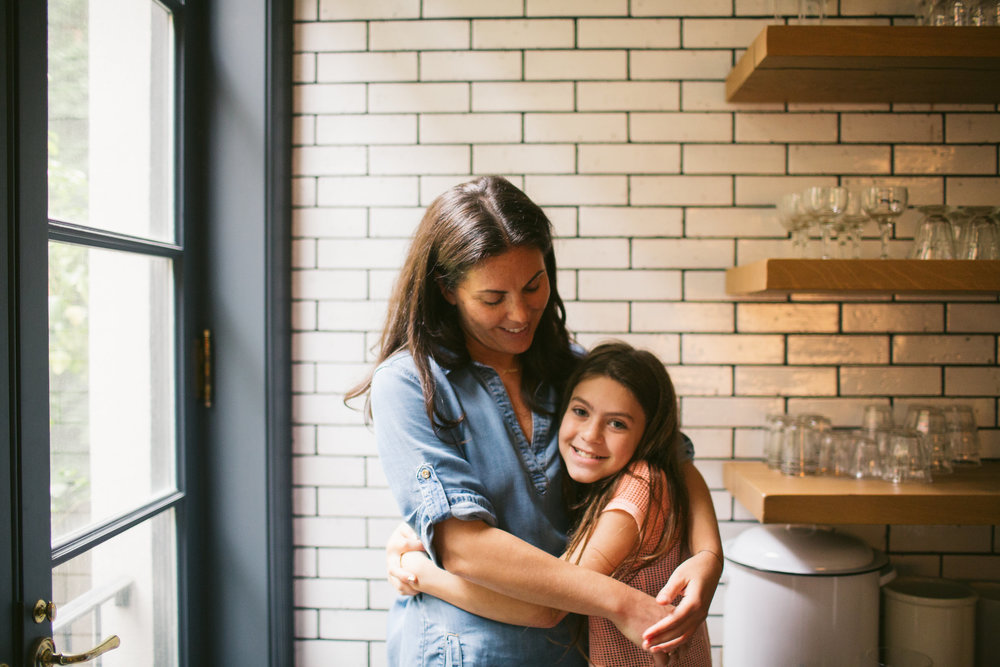
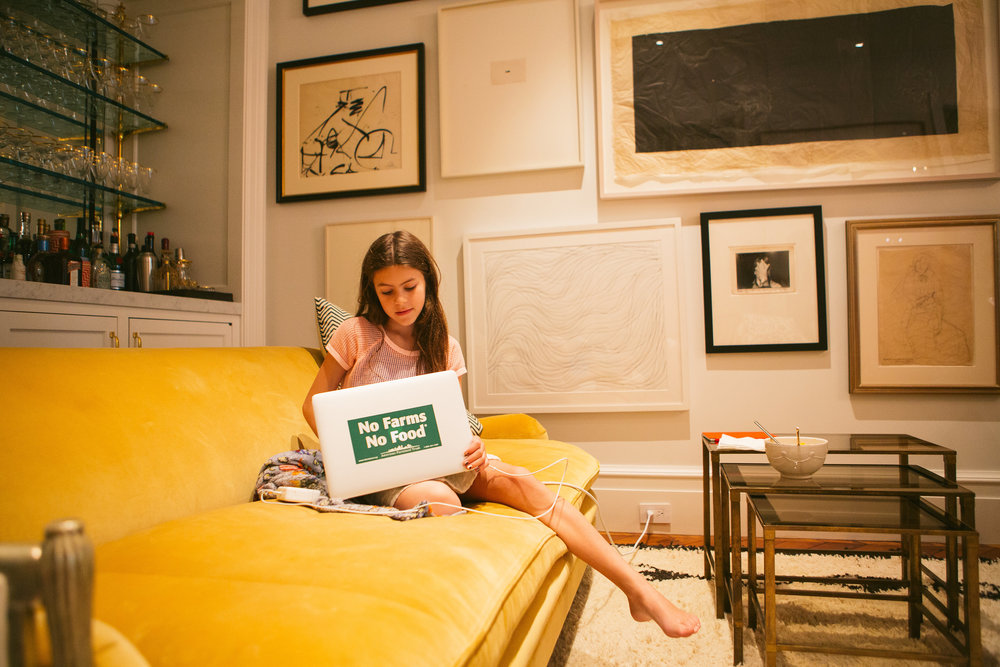
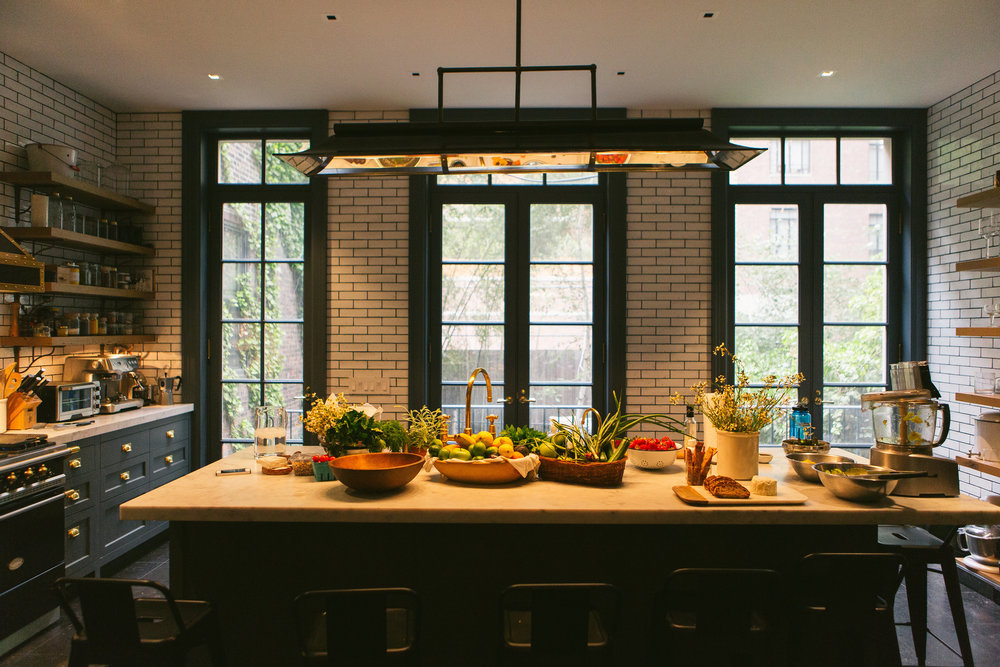
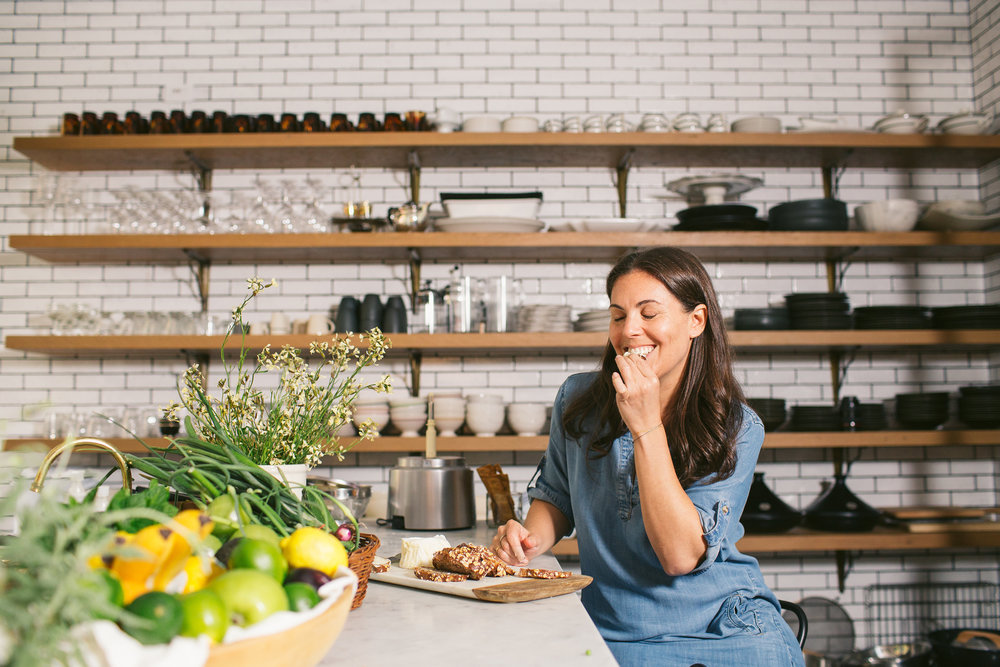
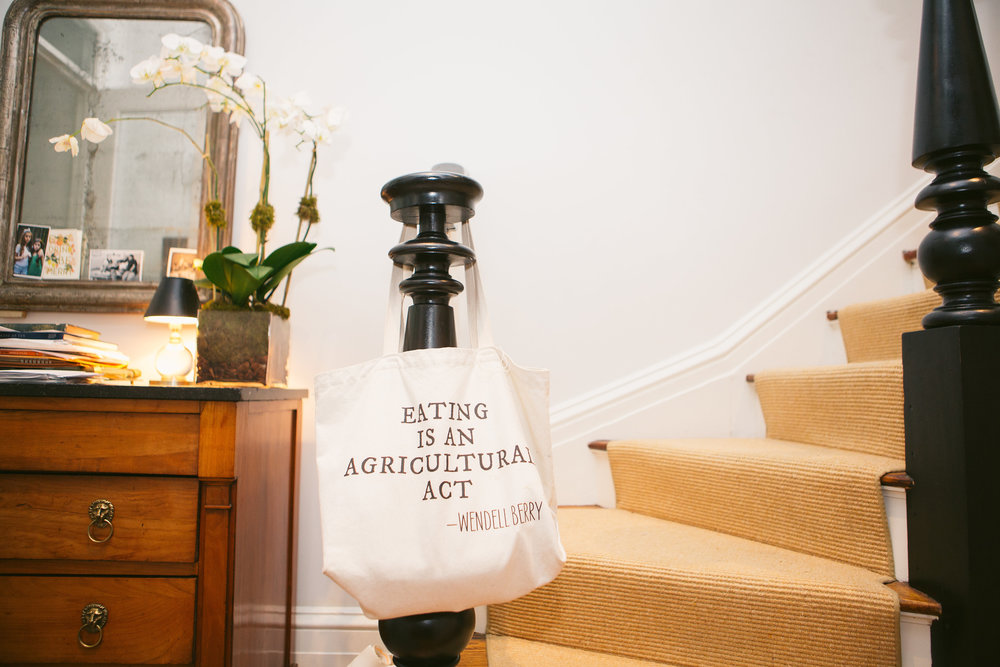
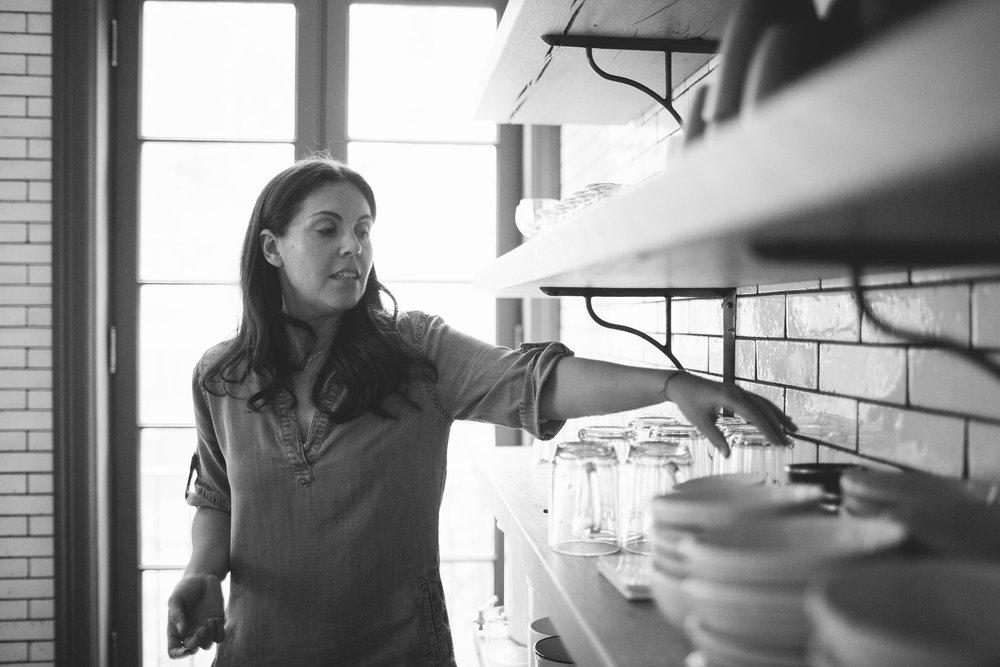
By Vanessa Packer
Photography By Sasha Israel
“WE NEED MORE TEACHERS,” Alison Cayne tell us as she prepares a seasonal vegetable salad from ingredients picked up from the farmers market. The mother of five and ardent lover of food politics was inspired by those wise words of Joan Gussow, and it drove her to open a culinary hub to teach people how to cook. “You can’t teach people that they have to go to the market to buy their produce if they don’t know what to do with it. We need to show people what to do with it,” she continues. Haven’s Kitchen opened in 2012 with a classroom kitchen, a cafe and party spaces large and small. The ethos from day one was grounded in supporting the farmers and educating the consumers on the quality of the food they buy as well as what to do with it. With classes teaching you how to make fresh pasta and working with a tagine, to the seasonal summer hit Rose and Grilling, Haven’s offers a global and diverse curriculum aimed to inspire and teach you how to make your meals at home more interesting and fun. “The number one reason why people don’t cook at home, it’s not space or time, people don’t cook at home because of fear,” Cayne explains. Beyond teaching the average New Yorker what to do with “The purple thing,” at their local farmers market, Cayne also volunteers at a food pantry in Hells Kitchen and speaks out in support of small farms in order to bridge the gap between the farmer and the consumer. Cayne invited us into her beautiful home in the West Village, complete with rooftop garden, for a tasty lunch and spirited conversation on the bourgeoning food movement and invigorated fight for food justice.
Have you always enjoyed cooking?
Yes, I started cooking when I was 8 years old. It reminded me of what normal happy families did, i.e. The Brady Bunch. I’ve always really liked food and always liked playing with food and ingredients. I always felt confident making food, which is really what we try to teach. The confidence seems to be the kicker when teaching people how to cook.
Were you always confident?
Yes, I never felt the pressure to make something beautiful for someone. By the time I started cooking in college, I knew what I was good at and I practiced what I wasn’t good at. I’m self taught and I’m not a real chef, I’m just a really solid home cook. I learned a lot from watching the chefs and they’ve learned a lot from me as a home cook.
What have you learned from them?
To ‘mise’ out my ingredients. (Meaning to have all the ingredients for the dish ready to go for cooking.)
What are some of the most essential things to have in the kitchen?
Good knives. In my opinion, any knife as long as it’s sharp. I sharpen them every two to three months, but I cook everyday. Then I would say a salad spinner. Dry lettuce is so important and makes all the difference in the world. One of the most depressing things to have is a limp salad. Also don’t overdress it. It’s nice to have a cutting board too.
What if you want to up your game in the kitchen?
I love a Cuisinart. I don’t use a mandolin because I will get hurt. I use a grater a lot.
What are some other tips you follow in the kitchen?
Don’t be afraid of acid. Working with chefs I’ve learned that. They put lemon on everything. It acts as salt and will bring out the flavor in the dish. Acid is your friend.
Where did the concept for Haven’s Kitchen come about?
I felt there was a void. I was inspired by the author Joan Gussow. She started out as a nutritionist and started talking about local eating around 1978, right after Rachel Carson’s Silent Spring came out. There is this amazing video with an interview where she is basically saying you can’t teach people that they have to go to the market to buy their produce if they don’t know what to do with it. We need to show people what to do with it. In this inspiring interview says, “We need more teachers.”




When you launched Haven’s Kitchen in 2012 what was your mission or ethos?
The ethos is really to support the farmers so they can feed everyone. For a long time we were losing farmers by the day because they couldn’t afford to farm in New York. The only way they are going to be able to farm in New York is if people buy from them. So it goes back to Joan Gussow, people in New York aren’t going to buy from them if they don’t know what to do with that vegetable. What is that random purple thing? They don’t know.
What were the first classes you started with and what was the curriculum?
I taught an ‘our family pantry class,’ which was basically what to have in your pantry to be able to do anything and some very basic classes like how to make a pesto. I was and still am very against the idea of sneaking anything into kids food. I don’t understand why that is a thing and how is became a thing. Have the kids involved in food, kids do not ‘naturally’ like carnival food over fruit, it’s just not true. They will like anything as long as you make it good and tasty.
When did you start expanding?
I always wanted it to be global. People say, “What kind of cooking school? What kind of classes?” It’s mostly anything you can make from the market, which turns out to be pretty much anything, depending on the season. I love teaching tagine. There’s one pot and there’s virtually no clean up.
What’s the most popular class?
Fresh Pasta fills up and Rose and Grilling.


Having all these classes do you have advice for the person that is scared of cooking? Steps to follow or guidelines?
I think the first thing is, try to remember it’s just dinner, it’s just a meal. I think people just like anything else, need to trust their instincts a little more, don’t set yourself up to fail by having a lot of equipment. Go to the market and see what looks good to you. I had a dinner party a few weeks ago and the entire dinner party was asparagus three ways. I did a boiled asparagus, with chopped egg, I did a grilled asparagus and then I did an asparagus frittata. Everyone thought it was so amazing, and no one missed a thing from the dinner. It’s only because I went to the market and that’s what looked best. I wasn’t really feeling anything else. People are just excited to be invited over, no one is expecting a gourmet meal. I think people put too much pressure on themselves.
What were you doing before you opened Haven’s?
I had 5 kids and I was really raising them, but I was always a cook, even in college. I’m self taught, so I never knew anything about proportions or measuring or anything. I would just make a vat of food whenever I cooked. I went to Duke, and I always taught friends, and friends of friends and then I started teaching at the Greenmarket. I wouldn’t really teach cooking, but more about where food comes from and just some basics in urban agriculture and connecting farmers to school visits with the Greenmarket. Then I realized it was great to teach kids and great to teach friends, but at the end of the day if I really wanted to help create an alternative food system I had to do something bigger then that. So I started looking for a space to just have a kitchen and a little party area. Then I fell in love with this building, which everyone says not to do.
At the end of the day, I do a lot of work to getting farm food to underserved communities, but someone has to pay for that. In my opinion it shouldn’t be the farmers, we shouldn’t be asking farmers to do more then their fair share. They are already struggling. I think the consumer has to start valuing food in a different way as well as labor. Part of that means that people need to start shopping at these markets so farmers have greater positioning when going into these neighborhoods. There are a lot of programs focused on getting fresh food to underserved communities, which is great, and it’s great to have those directed by the communities themselves, but there is a whole demographic of people that can’t afford to go to their market over the grocery store. My job is to get them to think differently.
What was the building before it was Haven’s?
It was empty when I got there. Years ago it was a Japanese screen manufacturer. He used to manufacture the screens upstairs and had retail downstairs. There was no staircase. I saw the space and thought, “Oh, now I can have a cafe, I can have parties.” I had no idea what I was getting into. I really just wanted to teach people how to cook.


Would you say you have a personal philosophy when it comes to cooking and food?
First of all, unless you are doing something as a project, like I want to learn how to do (blank) I don’t think any meal needs to take longer then a half hour. The number one reason why people don’t cook at home, it’s not space or time, people don’t cook at home because of fear. They are scared of messing it up or doing a bad job or making something that isn’t pretty. They’ll say it’s all those other excuses but the truth is that people are really nervous about cooking. In my option cooking is supposed to be at least in my opinion zen.


What should consumers be looking for if they can’t go to a farmers market?
Any possible way that they can get food directly from the source. Join a CSA or a food co-op.
Can you explain the difference between a CSA and a food co-op?
There are all these different models of how to build the bridge between the consumer and the farmer. We used to have that bridge completely. We each farmed our own thing, met in town and swapped. That was a long time ago. As we’ve become more urban and industrialized as a country, that connection was broken. The middle man can be a helpful thing. It helps the farmers because they are farming they don’t want to necessarily be trucking their goods into town, and it helps the consumers because it brings this fresh food to them. Distribution in and of itself is not necessarily a bad thing, except when you start cutting costs and compromising the product to compete with better prices. The food movement that is happening is reconnecting the people that are buying with the people that are producing. There are different ways to do it. CSA is a model of how to do that, the farmer sells shares of his year of produce to direct consumers who pay for a percentage of the produce that is grown there. You get a lot of produce, contrary to popular belief, for a discounted price. It’s good for the consumer because they get food that was in the grown two days ago, and we know that the fresher the food the more nutrient dense it is. Also, it hasn’t been traveling or handled, and it’s less chemical dependent. It’s good for the farmer because they may need to buy a new tractor and need to invest in their farm ahead of time, so they can get the money to do that and they know they will secure for the season. Food co-ops or buying clubs are another model, where either a group of people or let’s say 10 people in a building will purchase a large order to the farmer at a wholesale price.
Where you always interested in food politics?
I think the world of policy and politics wasn’t as accessible to people when I started school six years ago. Michael Pollen’s writing was just starting to hit the mainstream. The average New Yorker is only now starting to get an understanding of food justice and what this whole food system means.
I volunteer at a pantry in Hells Kitchen, and the guys that run it started to realize there wasn’t enough really good produce available from non-profits. Most of what they get are big bags of surplus commodity food. So they built a farm on the roof of this church, and they did it in kiddie pools because they are so light. They figured out a way to irrigate them, and now they grow a ton of food. I’ve been there on a Saturday, you start on the roof and you bring it downstairs to give it to the clients of the food pantry. You know, during World War Two, there were the Victory Gardens, where every building on Park Avenue had a roof top garden growing all kinds of vegetables, because there was an emphasis at that time on austerity and growing your own. It’s terrible that we have to be in a panic mode to change.


On the topic of food justice, are there three writers you recommend for people to read?
I absolutely love Wendell Berry. He’s 90 years old and a farmer in Kentucky. He’s a poet and he’s so smart and writes beautifully. He loves it in a really fundamental way. He talks a lot about our value system. People over machines, land over suburban sprawl and soil over oil. Also, Michael Pollan’s books are a great read.
What is a go to meal for when you are cooking at home?
I have taught myself how to make a perfect roast chicken and the best thing about a roast chicken is that it’s actually best if it sits lukewarm for a little bit. If I’m entertaining, I make three or four roast chickens, get them done, let them sit and they temper so nicely. They stay juicy but also retain crispiness. Then I make a big salad and usually serve bread and cheese. I like cheese a lot and I think it’s a lovely rounder to a meal. I also like to see what is around, what’s fresh and build off that. In the winter, I do a heartier curry and in the summer I make a green curry. Hot Bread Kitchen makes incredible flat bread that I pair it with. I learned that in Iran you take the flat bread put yogurt on it and they have herbs on the table with salt and lemon and you pick your own, put it together and make it taste how you want. You get to make your own appetizer. I like to get people involved. In the summer I’ll do two gazpachos, one red and one green and then I’ll serve chopped cilantro, jalapeño, avocado, corn, tomato whatever I feel like, and I’ll place them in bowls for people to mix and match themselves. It’s fun and I do it with the kids a lot too. If you’ve made it I think you like it more.

How hard of a line do you draw with the kids as far as what they are eating?
I don’t think anyone has ever learned anything with shoulds, people learn through love, as cheesy as that sounds. I’ve never gotten my children to eat anything by demanding them to, it’s because I make it really good and if they can make it with me it’s even better. It’s just showing your kids what your values are. There is a Keats poem that says, “Your children will love what you love,” so I just try to show them that. Sometimes they probably think I beat them over the head with my values, but that’s my job. It’s not so much what their eating but where did it come from, who grew it and what was that person’s values and how many steps did it take from its natural state to going into your body. Is that a fun food or a fuel food? It’s important to acknowledge the different and be conscious.
Do you have a non-negotiable that you do everyday?
Deep breathing everyday. For me, the goal of any kind of meditation is getting yourself out of your brain for a minute. Some people run, some people pray, for me it’s anyway that I can get outside of my own brain and not think about the past or future.


1063 Comments